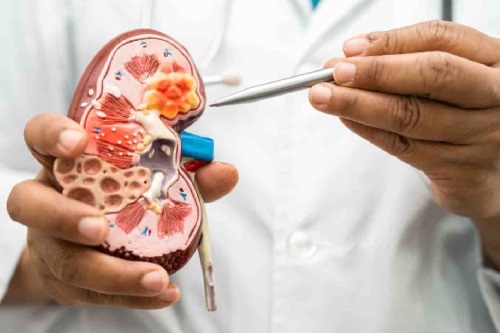Kidney Disorder

Kidney disease disrupts vital functions like blood filtration, water balance regulation, and blood pressure control. Additionally, it impacts red blood cell production and vitamin D metabolism essential for bone health.
You’re born with a pair of kidneys located on either side of your spine, just above your waist.
When kidneys are impaired, waste products and excess fluid can accumulate in the body, leading to symptoms such as ankle swelling, nausea, weakness, poor sleep, and shortness of breath. Left untreated, kidney damage can progress, potentially resulting in kidney failure—a critical and life-threatening condition.
In a state of health, kidneys perform several essential functions:
- Maintaining a delicate balance of water and minerals, including sodium, potassium, and phosphorus, within your bloodstream.
- Eliminating waste from the blood following processes like digestion, muscle activity, and exposure to chemicals or medications.
- Producing renin, a substance crucial for regulating blood pressure in the body.
- Generating erythropoietin, a hormone that stimulates the production of red blood cells.
- Synthesizing an active form of vitamin D, vital for bone health and various bodily functions.
- Remarkably, kidneys have the capacity to filter all the blood in your body every 30 minutes.
Kidneys possess remarkable adaptability and can compensate for certain issues that arise with kidney disease. Consequently, if kidney damage progresses slowly, symptoms may manifest gradually over time. In fact, symptoms may not become apparent until the disease has advanced significantly.
Potential symptoms of kidney disease include:
- Elevated blood pressure
- Nausea and vomiting
- Loss of appetite
- Metallic taste in the mouth
- Fatigue
- Weakness
- Cognitive difficulties
- Sleep disturbances
- Muscle twitches and cramps
- Swelling in the feet and ankles
- Persistent itching
- Chest pain due to fluid accumulation around the heart lining
- Shortness of breath caused by fluid accumulation in the lungs
Treatment for chronic kidney disease (CKD) is tailored to the specific stage of the condition:
Primary treatments include:
Lifestyle adjustments aimed at promoting overall health and well-being. Medications to manage accompanying issues such as high blood pressure and elevated cholesterol levels. In advanced stages of CKD (stage 5),
treatment options may include:
Dialysis: A procedure that replicates some kidney functions when the kidneys are no longer able to perform adequately. Kidney transplant: A surgical intervention that may be necessary to replace a failing kidney in advanced CKD.
